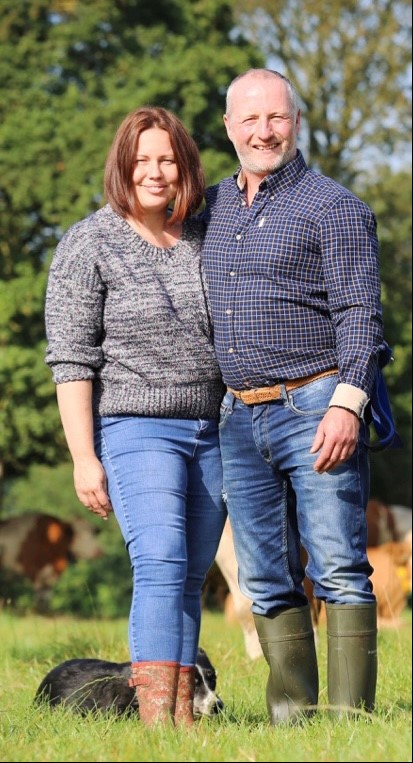Robust cows + excellent herd health = award-winning cheddar
Thursday, 8 September 2022
Farmer Tom Voizey from Marsh Farm in Somerset is a long-term Barber’s Cheese supplier and has worked hard to improve herd health with preventative vaccination, management and good hygiene, so reducing antibiotic use.
His 335-acre farm also has 30 acres of woodland and 30 acres of steep ground. The 130-strong pedigree Fleckvieh herd yields around 8,000 litres from a largely pasture-based system and, due to the breed, delivers constituents of 4.2% fat and 3.6% crude protein with very minimal inputs.
“Fleckviehs are known for being robust cows with good udder health, fertility and feet and legs,” says Tom. “Selective breeding for good health has been a bias in the breeding programme for many years, and producers are now reaping the rewards of that.”
Tom’s vet, Ed Powell-Jackson from Synergy Farm Health agrees with this: “Barber’s is one of the more rigorous milk buyers around, and there is a valuable financial bonus of being a Barber’s Assured producer. The Marsh Farm herd is very healthy, with an outstandingly low mastitis case rate of only 12 cases/100 cows/year, good levels of preventative vaccination, healthy feet and excellent fertility. And to top that, calves are often sold at around four weeks of age at Frome mart, regularly topping the market. Tom’s herd has a very low antibiotic usage rate, currently 7.8mg/PCU, which is only a third of figures from a recent report based on a large dataset, and well below our practice average.”
A change in the approach to calf rearing, with Tom’s wife Emmeline, focusses on attention to detail and hygiene.
“We parlour boarded the calving pens meaning its quick and easy to deep clean after calvings,” he says. “We also ensure that all the feeding equipment and milk prep area are clean and disinfected. Scouring calves are an issue on many dairy farms, and we don’t want our calf crop set back with ill-health in the initial few weeks of life. They are so well and healthy now that we rarely have to use antibiotics but will if needed of course.”
The herd calves year-round and Ed and Tom have adopted selective dry cow management where all cows receive a teat sealant but only those with higher cell counts having antibiotic dry cow therapy.
“Through preventative vaccination, Tom has eradicated BVD from the herd, has Salmonella under very good control, and respiratory issues in calves are rare,” Ed Powell-Jackson adds.
“Our system is simple yet effective,” Tom Voizey explains. “By choosing the Fleckvieh, we have a good starting place, and, with Ed’s input, health management is excellent. Couple that with a pasture-based system – we only house from late October through till last week of March – and good home-grown grass silage plus some crimped wheat and rape, and we have a healthy, happy herd producing excellent milk which goes on to make award-winning traditional cheddar.”
Barber’s Cheese
The world’s oldest surviving cheddar makers has been making cheddar from west country milk since 1833. With a milk pool across a 30-mile area in Dorset and Somerset, the business and its producers, strive to produce high quality, farm assured milk in a system where nothing goes to waste, and with the ethos: “happy cows = great milk” firmly at the heart of everything they do.
“A lot has changed in the almost 200 years Barber’s has been making cheese, and latterly this has included embracing technology to measure, monitor and help make changes, when needed,” says Michael Masters head of milk supply operations at the company. “All Barber’s milk suppliers share their antibiotic data with Medicine Hub. This means there is a way of recording and tracking use, reporting back either via vets or directly to the farmers and also that we are part of the ruminant sector’s efforts around defending its reputation with tangible facts.”


